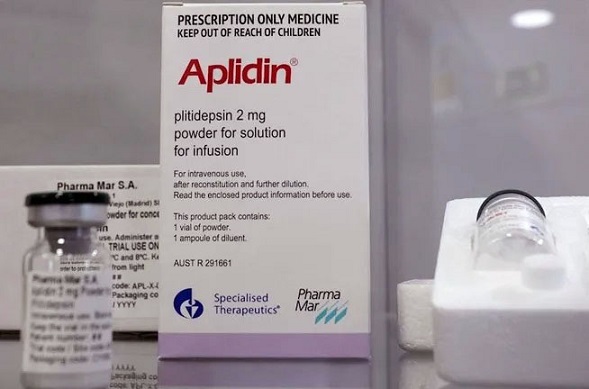Nikhil Prasad Fact checked by:Thailand Medical News Team Jul 17, 2025 6 months, 4 weeks, 2 hours, 37 minutes ago
Medical News: A cancer drug called plitidepsin is now being explored as a powerful new treatment against the monkeypox (Mpox) virus after scientists discovered it can significantly reduce viral replication and lung inflammation in infected animals.
 New Hope for Monkeypox Treatment as Cancer Drug Shows Strong Antiviral Effects
New Hope for Monkeypox Treatment as Cancer Drug Shows Strong Antiviral Effects
In a breakthrough that could change how monkeypox is treated, researchers from the Centro Nacional de Biotecnología (CNB-CSIC), PharmaMar S.A., Centro de Investigación en Sanidad Animal (CISA-CSIC-INIA), and the Centro de Investigación Biomédica en Red de Enfermedades Infecciosas (CIBERINFEC), all based in Spain, have found that the cancer drug plitidepsin effectively blocks monkeypox virus (MPXV) replication and reduces inflammation. This
Medical News report highlights the study’s findings that could lead to new antiviral treatments beyond current limited options.
Monkeypox has become a growing global health concern, with more than 100,000 reported cases in 121 countries since 2022. Though smallpox vaccines and a few antivirals exist, their effectiveness against MPXV has been limited. Additionally, concerns about resistance to drugs like Tecovirimat are rising. Plitidepsin, originally developed to treat cancer, works by targeting a host protein (eEF1A) crucial for many viruses to multiply, offering a different approach from traditional antivirals.
Lab Tests Show Powerful Antiviral Effects
The scientists tested plitidepsin on monkey cells infected with MPXV. The drug showed strong results, drastically reducing the virus's ability to reproduce. The half-maximal inhibitory concentration (IC50) for plitidepsin was just 3.15 nanomolar—far more potent than existing antivirals. Though some toxicity was observed at higher doses in cell cultures, the researchers also tested a safer, modified version called PM02348, which kept antiviral strength but with less harm to cells.
Further investigations revealed that plitidepsin acts after the virus enters the cell, likely by stopping the production of viral proteins early in the infection. This mechanism mirrors its previous success against COVID-19, where it disrupted viral processes by inhibiting eEF1A.
Animal Study Confirms Antiviral and Anti-Inflammatory Benefits
To evaluate plitidepsin in a living organism, researchers used CAST/EiJ mice, which are highly vulnerable to MPXV. The infected mice were treated with plitidepsin shortly after exposure. Within days, the drug reduced the virus in the lungs significantly. Treated mice also showed fewer signs of lung damage and lower levels of inflammatory chemicals like IL-6, IFN-γ, and CXCL10—known culprits in severe disease.
However, some toxicity was observed in mice, and a few deaths were recorded in the treated group. Scientists believe this may be due to the sensitive nature of the mouse strain used rather than the drug itself. Still, the early viral suppression and lowered inflammation point to promising poten
tial if dosage and delivery are refined.
Why This Matters
Current monkeypox treatments are struggling to keep up with new and more aggressive virus strains. Plitidepsin, already approved for cancer use in some countries, may offer a faster path to a new treatment if further trials confirm its safety and effectiveness in humans. Its dual ability to fight both the virus and the inflammation it causes gives it a unique edge.
With ongoing concerns about future outbreaks and drug resistance, the findings from this study suggest plitidepsin could become a valuable tool either as a standalone therapy or in combination with existing drugs. More clinical trials are needed to evaluate its real-world use against monkeypox, especially in humans with compromised immune systems or in regions where vaccine coverage is low.
The study findings were published in the peer reviewed journal: Antiviral Research
https://www.sciencedirect.com/science/article/pii/S0166354225001640
For the latest on Monkeypox, keep on logging to Thailand
Medical News.
Read Also:
https://www.thailandmedical.news/news/siga-technologies-faces-major-legal-issues-as-its-mpox-drug-tpoxx-tecovirimat-fails-and-its-cmo-is-terminated
https://www.thailandmedical.news/news/oregon-doctors-warn-of-potential-cardiac-issues-linked-to-jynneos-mpox-vaccine
https://www.thailandmedical.news/news/scientists-warned-in-2009-that-vaccinia-virus-in-current-mpox-vaccines-impairs-critical-immune-functions
https://www.thailandmedical.news/articles/monkeypox
